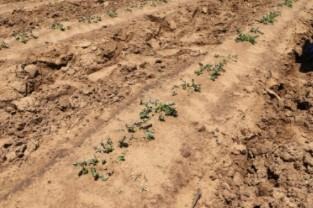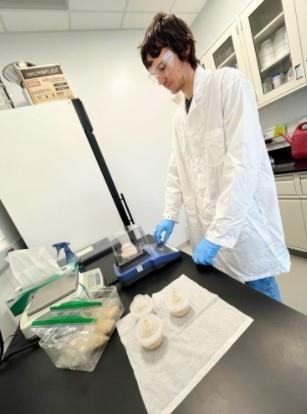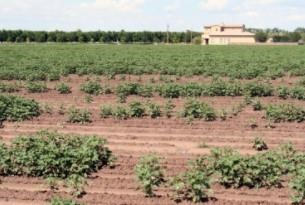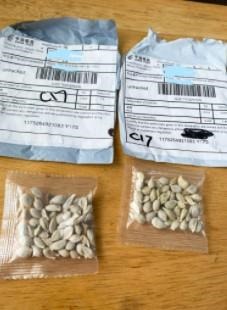Protecting seed health is essential for reducing plant disease threats that can endanger the food and fiber system on a global scale.

Bacterial early decline disease of peanut seedlings caused by seedborne pathogens in affected plants. (Texas A&M AgriLife photo courtesy of Ken Obasa.)
The World Seed Federation reports that global seed exports netted $14.4 billion in 2019 and imports, $13.8 billion. Seeds contaminated at their origin or during transport can introduce invasive pathogens or pests, disrupt production, increase supply chain issues and cause devastating international economic impacts.
Texas A&M AgriLife offers state-of-the-art diagnostic services, research and educational outreach to protect from plant health risks associated with transporting seeds.
Providing premier diagnostic laboratories
Two nationally acclaimed laboratories provide accurate and timely plant diagnostic services for Texas A&M AgriLife personnel, farmers, the agriculture and green industries, and Texas residents. The Texas Plant Disease Diagnostic Laboratory in College Station and the Texas High Plains Plant Disease Diagnostic Laboratory in Amarillo are part of the National Plant Diagnostic Network and managed by the Texas A&M University Department of Plant Pathology and Microbiology.
The College Station facility handles about 3,000 samples and processes more than 5,000 disease-monitoring survey samples each year.
The diagnostic laboratory in Amarillo at the Texas A&M AgriLife Research and Extension Center specializes in disease diagnostics of small grains and row crops such as wheat, corn, sorghum and cotton. In addition, following the legalization of hemp production in Texas, the laboratory offers hemp plant disease diagnostic services.

Jake Ueckert, AgriLife Extension associate, tests tomato seeds for ToBRFV. (Texas A&M AgriLife photo courtesy of Kevin Ong.)
“Seed safety is a phytosanitary, or plant health, issue,” said Kevin Ong, Ph.D., AgriLife Extension plant pathologist and director of the College Station laboratory. “Because some plant disease pathogens can be transmitted in seeds, phytosanitary rules and requirements regulate moving or importing certain types of seeds in agriculture.”
Both laboratories help the U.S. Department of Agriculture – Animal and Plant Health Inspection Service, USDA-APHIS, the Texas Department of Agriculture, TDA, and seed industries by providing seed health testing services to address pathogens of high consequence, Ong said.
“Reliable testing is crucial,” said Ken Obasa, Ph.D., AgriLife Extension plant pathologist and leader of the Amarillo laboratory. “It ensures a healthy seed supply, prevents or controls the spread of disease, and increases crop yield, profitability and trade.”
One example of how the laboratories help support seed health is testing for the tomato brown rugose fruit virus, ToBRFV, in pepper and tomato seeds. To prevent the introduction of ToBRFV into the U.S., a federal order regulates the transport of tomatoes and peppers, and tomato and pepper seeds must be tested for the virus.
The Texas Plant Disease Diagnostic Laboratory Applied Research Unit, in collaboration with seed health industry partners, helped validate a detection test for this pathogen. The test was approved by the National Seed Health System. The laboratory also offers ToBRFV seed testing services to the seed health testing industry.
Making research-based information available to growers and the seed industry
In addition to testing seeds for pathogens, another important way to protect seed health is by communicating timely information to growers.

Seedling death caused by FOV4 created bare areas in this cotton field. (Texas A&M AgriLife photo courtesy of Thomas Isakeit.)
For example, in 2017, fusarium wilt of cotton race 4, FOV4, was confirmed in cotton fields in El Paso and Hudspeth counties. The seedborne fungal disease creates substantial yield loss by causing large areas of seedlings in a field to die. Older plants develop wilt and root rot. The disease can also spread to other cotton fields if contaminated soil is transferred by farm equipment.
Texas A&M AgriLife plant pathologists studied the biology of the pathogen and began field trials, identifying where the problem was and the resistance of different cotton varieties to FOV4. Their recommendations will help breeders develop new varieties.
Plant pathologists also developed methods and best management practices that cotton growers can use to prevent and mitigate the disease.
“On a statewide basis, Texas A&M AgriLife plant pathologists are educating cotton growers and the seed industry about the risk of this disease and the need to ensure that they are not planting seed produced in areas where this disease occurs,” said Thomas Isakeit, Ph.D., AgriLife Extension plant pathologist in the Department of Plant Pathology and Microbiology.
The situation is ongoing and being monitored to confirm that FOV4 is not spreading beyond the El Paso-Hudspeth counties area, Isakeit said.
Informing Texans to safeguard Texas agriculture

Mystery seeds that thousands of people received in the mail. (Photo courtesy of Washington State Department of Agriculture.)
Growers can do a great deal to contain the spread of plant pathogens, but the public must also be made aware of seed-related risks.
In summer 2020, thousands of people across the U.S. received packages of unidentified seeds in the mail. Assisting the outreach efforts of USDA-APHIS and TDA, Texas A&M AgriLife responded quickly to educate Texans of the serious threat the seeds could have on the state’s agriculture and environment.
News stories and media advisories explained why recipients should not open the packages, plant the seeds or even throw away the packages — the unrequested seeds from an unknown source could introduce pathogens or invasive weeds. The educational outreach also included instructions for reporting receipt of the seeds to USDA-APHIS.
Offering readily available resources
Disease pathogens can quietly and quickly move to new locations in contaminated seeds. Ong said the best preventive measure is to buy seeds from a reputable source or dealer, and if problems develop, local AgriLife Extension county offices and Texas A&M AgriLife diagnostic laboratories can help with disease diagnosis and testing.